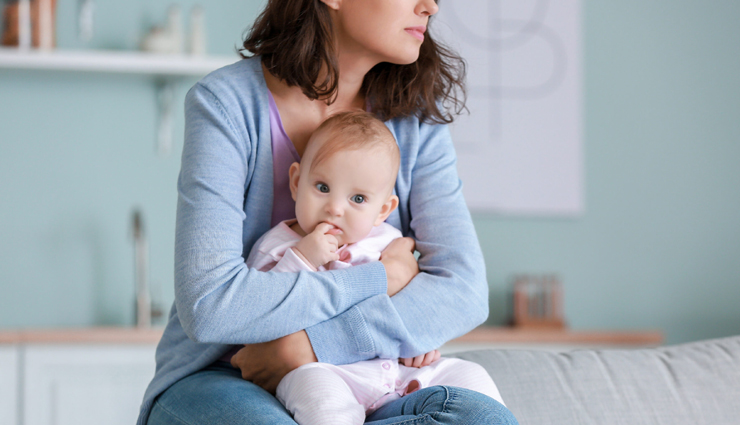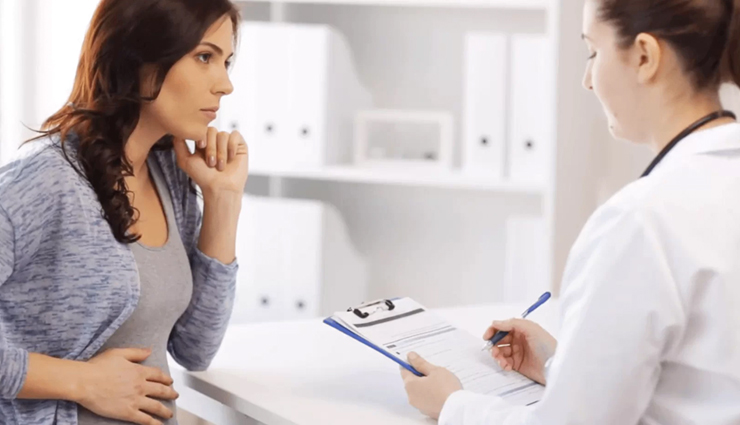- Home›
- Healthy Living›
- 5 Things To Keep In Mind About First Period Post Pregnancy
5 Things To Keep In Mind About First Period Post Pregnancy
By: Priyanka Maheshwari Sat, 17 June 2023 09:27:15

After the joyous experience of pregnancy and childbirth, a woman enters a unique phase known as the first period post-pregnancy, also referred to as postpartum menstruation. This period marks the return of the menstrual cycle following the temporary suspension during pregnancy and childbirth. It is a significant milestone in a woman's postpartum journey, signifying the restoration of hormonal balance and reproductive function.
The timing of the first period post-pregnancy can vary for each woman. Some may experience it within a few weeks after delivery, while others may take several months, particularly if they are breastfeeding. The return of menstruation depends on numerous factors, including individual physiology, breastfeeding practices, and contraceptive methods used.
Physiologically, the first period post-pregnancy can differ from a woman's usual menstrual cycle. The body undergoes several hormonal adjustments during this time, which can impact the length, intensity, and regularity of the menstrual flow. It is not uncommon for the initial periods to be irregular, heavier, or accompanied by discomfort such as cramping and bloating.
It is essential for women to keep in mind that their fertility can resume even before they experience their first postpartum period. Ovulation can occur before menstruation, meaning that pregnancy is possible even if menstruation has not yet returned. Therefore, it is crucial to consider reliable contraceptive methods if planning to prevent pregnancy during this period.
Postpartum periods can also bring about emotional changes due to hormonal fluctuations. Women may experience a mix of emotions as they adjust to the demands of motherhood while navigating the physical and hormonal changes associated with menstruation. It is important to seek emotional support and communicate any concerns or difficulties experienced during this time.
Additionally, managing menstrual hygiene is crucial during the first period post-pregnancy. Using appropriate sanitary products, maintaining good hygiene practices, and seeking medical advice if any abnormal symptoms occur can help ensure optimal health and well-being.

# Not all the blood down there is period blood
Let's clarify something before discussing periods. The bleeding that occurs right after giving birth is not considered your first period. Instead, it is part of the lochia stage, during which your body eliminates the uterine tissue that was necessary to protect the baby. Initially, this discharge is dark red and gradually transitions to a pinkish, brown, and eventually creamy or yellowish color. After about four to six weeks post-delivery, it will cease entirely.

# Stubborn Aunty Flo can take her own sweet time to come back
According to a study published in the journal Obstetrics & Gynecology in 2011, it may take approximately 45 to 94 days (around six to 13 weeks) for menstruation to resume after childbirth. In some cases, the return of periods can be delayed for up to six months, as stated by Dr. Anuradha Kapur, director and head of the Institute of Obstetrics and Gynecology at Max Multi-Specialty Centre in Panchsheel Park, Delhi.
The reason for this delay can be explained by the impact of breastfeeding. In breastfeeding mothers, periods may not occur as long as breastfeeding continues. This phenomenon is known as lactational amenorrhea. The hormone prolactin, responsible for milk production, can suppress reproductive hormones and lead to a temporary absence of ovulation, a condition known as anovulation.

# Lack of periods doesn’t meant that you can have unprotected sex
I understand that learning about ovulation and suppressed reproductive hormones may have given you a sense of hope. However, it is important to note that the absence of periods should not be mistaken as a foolproof method of birth control with an expiration date.
A study conducted by the Association of Reproductive Health Professionals revealed that 1 in 100 women can still become pregnant after engaging in unprotected sex while experiencing lactational amenorrhea. So, while the chances may be low, it is still possible.
To ensure effective contraception, non-hormonal methods such as a copper intrauterine device (IUD) or condoms are considered the safest options, unless advised otherwise by your doctor.
# A heavy and irregular flow can be a natural part of Aunt Flo version 2.0
When your pregnancy comes to an end, your first period can be characterized by heaviness, pain, irregular duration and intensity, and even mood swings. It's not uncommon to notice a few clots during this time, which is generally not a cause for concern.
After a long period without bleeding, it's understandable to wonder what to expect. After all, your body needs to shed the excess uterine lining that has built up. But don't worry, using a hot water bottle and engaging in mild physical activity can provide some relief.
However, for women who had endometriosis before pregnancy, it is possible to experience a lighter and less intense period after giving birth.

# Do NOT ignore these warning signs of Aunty Flo’s changed behavior
Certainly, your first period after pregnancy will differ from your previous experiences. However, it is crucial to remain vigilant and not overlook certain alarming signs.
If your periods are excessively heavy, requiring you to change your pad every 30 minutes to an hour, it is essential to seek medical attention. A super-heavy flow, an abundance of clots, severe pain accompanied by fever, and a foul-smelling discharge are warning signs that should not be ignored. These symptoms could indicate an infection or, in more serious cases, gestational trophoblastic disease. This condition is relatively common after pregnancy and involves the growth of potentially cancerous tumors inside the uterus.





